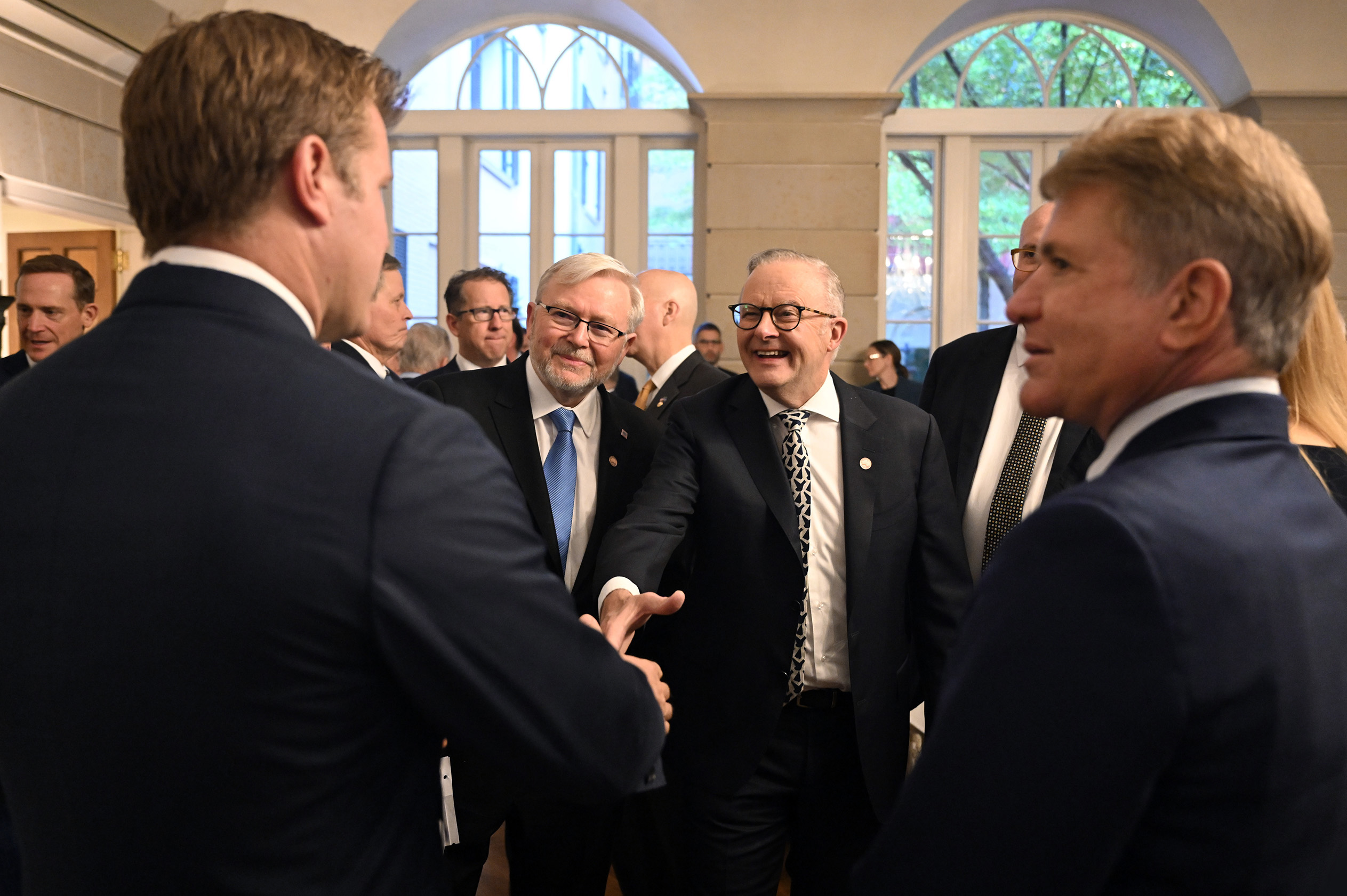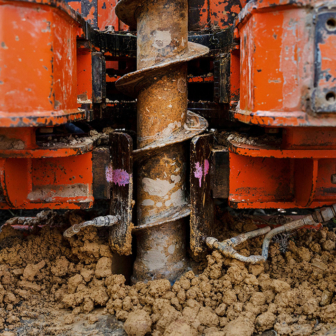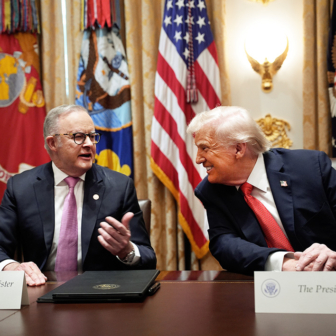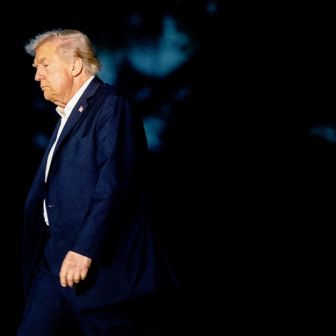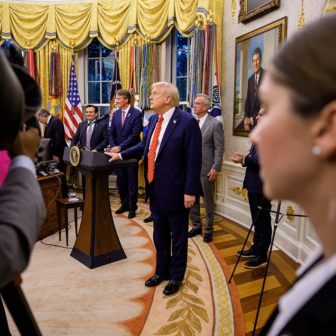Back in 2015 Kevin Rudd was appointed inaugural president of the Asia Society Policy Institute — a self-described “think–do tank” modestly dedicated to “using second-track diplomacy to assist governments and businesses in resolving policy challenges within Asia, and between Asia and the West.”
The New York-based institute, an initiative of the prestigious Asia Society founded in 1956 by John D. Rockefeller III, was a welcome sinecure for the irrepressible intellect of the twenty-sixth prime minister of Australia. By 2021 he would add the titles president and CEO of the Society itself to his tirelessly burnished CV.
Dr Rudd described himself as an “independent think tanker” during his time at the policy institute before he landed the job of Australian ambassador to Washington in 2023. “As an independent think tanker, people expect you to exercise a wide latitude of engagement in the public policy debate,” he later explained.
As we are all now painfully aware, wide latitude includes offering frank assessments of former presidents of the United States, which is all very fine unless the president in question makes a Lazarus-like comeback for a second term and you become Australia’s supplicant-in-chief in America.
In social media posts back in 2020–21, Rudd wrote that Trump was the “most destructive president in history” and “a traitor to the West,” among other unflattering appraisals. But in November last year, after Trump was re-elected, he promptly deleted all the posts “out of respect” for the office of president.
As some in the media have pointed out in recent days (with notable exceptions in the Murdoch camp) Rudd’s social media history was positively tame compared with the two most senior members of Trump’s cabinet. In 2016 Vice President J.D. Vance called Trump “America’s Hitler” and compared him to O.J. Simpson as a “hated, villainous, douche celeb.” Around the same time, secretary of state Marco Rubio called him ”a con artist” who had “spent his entire career sticking it to the little guy.”
The revisiting of this awkward history during Anthony Albanese’s visit to Washington has brought back troubling memories of reporting from Southeast Asia in another millennium.
Back in the 1990s, former foreign minister Gareth Evans would rail in exasperation that there were only two types of stories that interested Australian journalists covering the region — “the row and the kowtow.” In essence, the stories that guaranteed media coverage were ones where Australian leaders and officials were in heated disagreement or, better still, open conflict with their regional counterparts (the row) or were deemed to be compromising or, better still, grovelling to defuse or end such conflicts (the kowtow).
In my experience, one of the richest veins tapped in this unedifying journalistic genre was the unhappy relationship between prime minister Paul Keating and his Malaysian counterpart Mahathir Mohamad.
In 1993, when Mahathir declined an invitation to attend the leaders’ meeting in Seattle of the Asia-Pacific Economic Cooperation forum — a project pioneered and driven by Australia — Keating dismissed him as “recalcitrant.” While many observers needed to dust off their dictionaries to clarify the gravity of this rebuke, a row erupted in Kuala Lumpur that strained relations between the two countries… and Keating refused to kowtow.
For years thereafter, Australian journalists in need of a quick headline from Mahathir press conferences would throw baiting questions about the shortcomings of Keating in particular, and Australia in general. Mahathir was rarely recalcitrant in replying, and indeed seemed to relish the sport. This nonsense of course did nothing to advance the sum of human wisdom or the health of the relationship between Australia and Malaysia.
I was overwhelmed by a sense of déjà vu reading the headlines after last week’s White House meeting and press conference between Trump and Albanese. “Trump Takes Swipe at Rudd”; “White House Spray”; “Australian Ambassador Humiliated”; “Trump Scolds Rudd”; “Trump Puts Kevin Rudd in his Place” etc. etc. Even the earnest Conversation joined the pile on: “Clip Over the Ear for Kevin Rudd.”
I rushed to find video footage to witness the enormity of what clearly had been a disastrous confrontation between the Kevin we thought was there to help and the pugilist president. How could what, by all accounts, was an astonishingly cordial and constructive meeting between Albanese and Trump have been derailed so dramatically?
Moments after Sky News Australia political editor Andrew Clennell caught Trump’s attention, I saw the good old “row” button flashing green. Clennell then charged in, helpfully offering Trump a multiple-choice opportunity to stick the boot into Albanese, Rudd or both.
“There is concern in Australia that it has taken nine months to get this meeting,” Clennell intoned, neglecting to acknowledge that the only people genuinely exercised about the delay were a flailing faction of the Coalition and their Sky After Dark and Murdoch tabloid spruikers. “Have you had any concerns with this administration with its stance on Palestine, climate change or even things that the ambassador said about you in the past in Australia, the Australian ambassador?”
The question triggered a bombshell. But it was not the one Andrew Clennell so ardently anticipated and the subsequent coverage “buried the lead,” as they say in the craft. The real revelation was that Donald Trump had no idea who Kevin Rudd was and no idea what he had said that so clearly deserved his umbrage.
“I don’t know anything about him,” said a bewildered Trump. “If he said bad then maybe he’d like to apologise.” Then, turning to Albanese, he asked: “Did an ambassador say something bad about me?” As Albanese was about to speak, Trump continued: “No, don’t tell me. Where is he? Is he still working for you?”
On the opposite side of the table, Kevin Rudd seemed momentarily and uncharacteristically lost for words, obviously fearful of what might be coming next — and presumably mortified that after two and a half years as Australia’s top envoy in Washington and nearly a year at the court of King Donald, Trump apparently did not recognise him.
As the press pack standing behind Rudd howled with laughter, Clennell gleefully pointed the president in the direction of Rudd. “Did you say something bad?” asked Trump. “Before I took this position, Mr President,” replied Rudd. “I don’t like you either and probably never will,” said Trump.
It was, the Guardian later observed, “the testiest and most uncomfortable remark at a typically freewheeling” presidential press conference: “But it was quickly followed by laughter across the packed room: the guffaws coming as if a pressure value had been released in government and diplomatic circles.”
After an immediate apology delivered by Rudd at the end of the presser (Kowtow: “Rudd Issues Grovelling Apology”), Trump was reported to have told Albanese that he “seems like a nice guy” before declaring: “All is forgiven.” That ought to have been the end of it — especially after Albanese later batted back opposition calls for Rudd’s sacking and heaped praised on Rudd as “an outstanding representative” of Australia in Washington who was “working his guts out.” But this ignores one of the foundation principles of row/kowtow journalism: when you’re on a roll, stick with it.
At the weekend, as Trump was leaving Washington to attend the Asean summit in Kuala Lumpur, Australian journalists were back in the hunt. Asked by Nine newspapers’ Michael Koziol whether he had forgiven Ambassador Rudd (kowtow plus row), Trump unhelpfully replied: “No, I don’t know anything about him.” Then, having just forgotten, he declared that he was a man who never forgets: “I think he said a long time ago something bad. You know, when they say bad about me, I don’t forget.”
Perhaps this could have been the basis of fresh news stories about Donald Trump’s apparently accelerating mental decline, but Murdoch’s news.com.au was in no doubt that they had yet another “row” in the bag. “Smiling Assassin: Donald Trump Takes Another Swing at Kevin Rudd,” shouted the headline, then: “Donald Trump has warned Kevin Rudd he never forgets people who badmouth him despite telling Australia’s Ambassador that ‘all is forgiven’.”
Maybe we should never forget that Kevin Rudd along with Malcolm Turnbull led the campaign for a royal commission into the Murdoch media empire, describing it as a “cancer on our democracy.” •
